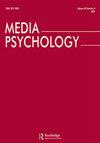Angry Content for Angry People: How Anger Appeals Facilitate Health Misinformation Recall on Social Media
IF 3.4
2区 心理学
Q1 COMMUNICATION
引用次数: 0
Abstract
ABSTRACTSocial media is often viewed as a breeding ground for misinformation, given the anger-laden nature of its content. Despite the persuasiveness of anger and misinformation on social media, little is known about how misinformation surges in power when users are exposed to misinformation-related anger appeals and/or misinformation-unrelated (i.e. ambient) anger. Employing two online experiments across different health contexts, the studies test mechanisms of anger appeals and their individual and combined effects on misinformation recall. Specifically, Study 1 (N = 210) examines the interaction between a misinformation-related anger appeal and issue relevance, illustrating that issue relevance increased the recall of emotion-neutral appeals but did not influence recall among those exposed to the misinformation-related anger appeal. Expanding on this finding, Study 2 (N = 400) investigates a three-way interaction between exposure to a misinformation-related anger appeal, ambient anger, and issue relevance. The findings underscore the role of ambient anger in contributing to misinformation recall for users with high issue relevance and those exposed to misinformation-relevant anger appeals. These results further highlight the complex and conditional influence of anger appeals on misinformation recall. Disclosure statementNo potential conflict of interest was reported by the author(s).Additional informationFundingThis work was supported by the Ministry of Education of the Republic of Korea and the National Research Foundation of Korea [NRF-2021S1A5C2A02088387].愤怒的人的愤怒内容:愤怒的呼吁如何促进社交媒体上的健康错误信息回忆
社交媒体通常被视为错误信息的滋生地,因为其内容充满了愤怒。尽管社交媒体上的愤怒和错误信息很有说服力,但当用户暴露在与错误信息相关的愤怒呼吁和/或与错误信息无关的(即环境)愤怒中时,错误信息是如何发挥作用的,我们知之甚少。通过在不同的健康背景下进行两个在线实验,研究测试了愤怒诉求的机制及其对错误信息回忆的个体和综合影响。具体而言,研究1 (N = 210)检验了与错误信息相关的愤怒呼吁与问题相关性之间的相互作用,说明问题相关性增加了对情绪中立呼吁的回忆,但不影响与错误信息相关的愤怒呼吁的回忆。在这一发现的基础上,研究2 (N = 400)调查了与错误信息相关的愤怒诉求、环境愤怒和问题相关性之间的三向相互作用。研究结果强调了环境愤怒在与错误信息高度相关的用户和那些暴露于错误信息相关的愤怒呼吁的用户回忆错误信息方面的作用。这些结果进一步强调了愤怒诉求对错误信息回忆的复杂和条件影响。披露声明作者未报告潜在的利益冲突。本工作得到了韩国教育部和韩国国家研究基金的支持[NRF-2021S1A5C2A02088387]。
本文章由计算机程序翻译,如有差异,请以英文原文为准。
求助全文
约1分钟内获得全文
求助全文
来源期刊

Media Psychology
Multiple-
CiteScore
8.60
自引率
7.10%
发文量
30
期刊介绍:
Media Psychology is an interdisciplinary journal devoted to publishing theoretically-oriented empirical research that is at the intersection of psychology and media communication. These topics include media uses, processes, and effects. Such research is already well represented in mainstream journals in psychology and communication, but its publication is dispersed across many sources. Therefore, scholars working on common issues and problems in various disciplines often cannot fully utilize the contributions of kindred spirits in cognate disciplines.
 求助内容:
求助内容: 应助结果提醒方式:
应助结果提醒方式:


